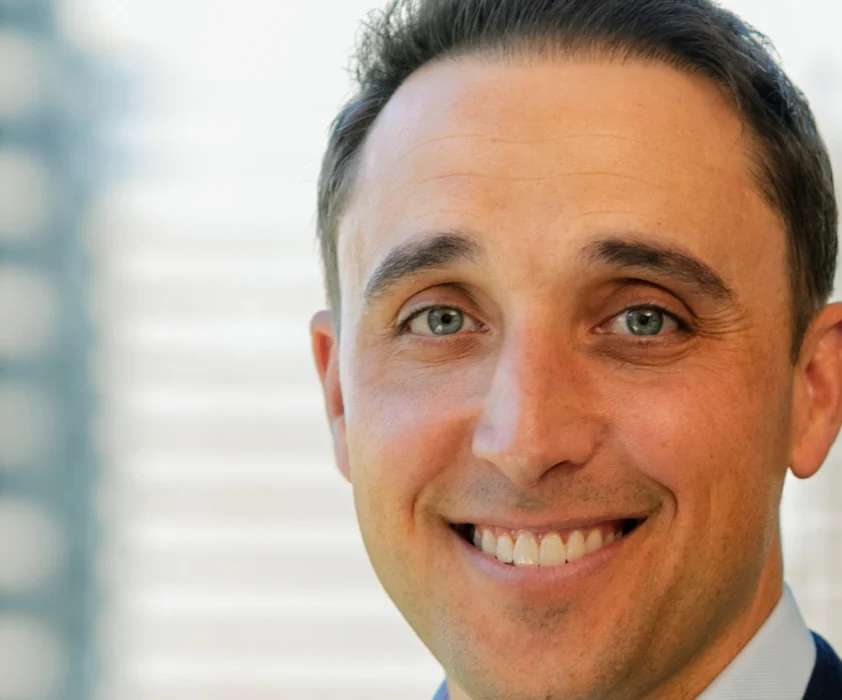
With more than a decade of commercial real estate experience, Doug Jones is not only a well-respected and savvy leader in the industry but embodies the kind of dynamic spirit, discipline, enthusiasm, and guidance that truly sets him apart. Luckily for Stream, he joined the firm’s ranks in early 2024 as Managing Director of Office Services for the company’s Texas markets, and has been sharing his wealth of expertise and diverse insights, both internally and externally, ever since.
ALL IN THE FAMILY
A decorated combat veteran who served as an Army Ranger after graduating from the United States Military Academy at West Point, Doug’s perspective and mindset have enabled him to call upon his special training to bring a unique outlook to a variety of situations within corporate real estate.
“I felt called to serve in the military from a very young age,” Doug explained. Having come from a legacy military family—his dad graduated from West Point in 1971, and both grandfathers were career Army—you could say it was in his blood that he would follow in their footsteps.
THE DRIVING FORCES OF CHARACTER BUILDING
“I’ve learned a lot of valuable lessons from my time in the military. One of them is that ordinary people are capable of extraordinary things when driven by the right values. As an individual and an organization, your values need to be clearly defined, and sometimes they have to be defended, which can require sacrifice.”
“As a young cadet, you’re aware of the realities of military service, but going through the 47 months of a demanding experience, becoming a commissioned officer, and finally being deployed to combat…you’re less fearful than you are eager to go and contribute.”
CRE’S APPEAL
Doug’s path to commercial real estate first came through an unlikely introduction to a CRE broker upon his return from deployment in 2011. The more he learned about the business, the more he was drawn to the relationship-first mentality of high-performance individuals with competitive natures, a complex and rapidly changing environment, and the impact on surrounding communities.
“I felt I’d found an industry with many great attributes that I wanted to be a part of, and from that point on, I didn’t consider anything else. It became my singular focus.”
THE CONFERENCE ROOM
According to Doug, lessons learned about being a team player in sports and the military supported his transition into CRE.
“We are in a service business, and it’s highly competitive. You need to understand the best way to communicate with your team and clients, especially in pressure situations. Paying attention to detail is table stakes, but your ability to think strategically, operationally, and tactically, which is how the military trains their leaders, was a big help in my early years.”
Throughout his career, he’s been translating these skills to the CRE environment, both when leading teams and transactions.
He also attributes his sports background (soccer and martial arts) to teaching him how to truly pay attention. It really comes down to HOW to think versus WHAT to think. Part of expanding influence is setting a vision and an example, whether on the field or in the conference room.
THE TRUE MARK OF A LEADER
When it comes to how he’s honed his leadership skills over the years, Doug acknowledges how many of his coaches throughout his high school and collegiate sports career played an integral role. While a rising sophomore on the West Point soccer team, his coach asked him to step in as one of three captains. “Being a young team captain, I had to learn how to navigate unfamiliar waters. It was certainly a defining point for me in how to set my leadership philosophy, which was defaulting to actions rather than words. I couldn’t talk about being a leader; I had to show it by setting the example. That coach’s decision was a big influence on me.”
While at West Point and when deployed, Doug witnessed a variety of leadership styles (some good, some elite, and some an example of what NOT to be). But a consistent attribute he believes all great leaders have is personal courage. “Often, courage is associated with something physical, but more often than not, it’s a personal, moral courage to seek the truth (predicated on being humble), regardless of situational ethics or potential personal ramifications.”
According to Doug, courage takes different forms, but being consistently convicted about humility and continuing to learn requires courage. “Taking responsibility and being held accountable also takes courage,” he adds.
In his opinion, accountability gets a bad rap. Still, the best organizations he’s been a part of understood that clearly defined responsibilities and a willingness to hold others—or be held accountable—are keys to collective success.
MANAGING ADVERSITY
As any commercial real estate broker can tell you, it’s not exactly a straightforward career trajectory, especially during the first few years. Starting out in the industry comes with daily rejection, the pressures of cold calls, early mornings/late nights, busting down doors to try and drum up business, and educating yourself on market dynamics. Some aren’t lucky enough to have a veteran broker to take them under their wing and provide them with the mentorship and insight so desperately needed when coming up through the ranks. With CRE being a commission-based industry, it’s no surprise that daily speed bumps and failures come with the territory. A decent number of broker associates succumb to these pressures and barely make it more than a year or two in the business.
Doug recalls a turning point mentally when he was working on a large transaction on a high-profile assignment. The lease was out for signature, and Doug recalls that it would essentially keep him and his wife financially afloat for another few months. But the deal died. As some in the business know, deals can die more than once, but this one did not come back around.
Psychologically, he had a choice. “I remember being almost defiant to the industry, saying, “Bring it on, I’m not giving up. “You need to accept that there will be a lot of disappointment in this industry and in life.”
It’s safe to say that Doug’s Ranger training, infantry experience, and combat in Afghanistan—combined with his participation in collegiate sports—has prepared him in more ways than one to face challenges in CRE. “To be honest, the major advantage in all of it is perspective. Knowing that in the end, everything’s going to be okay, no one’s getting hurt when things don’t go as planned. We all have experiences in our lives where we need to be tough, lean on others, and if we can keep the right perspective, we can regroup, show up, and keep hustling.”
KEEPING TEAMS ON COURSE
“On course” implies you have a vision that’s been communicated. “You’d be surprised how many teams and organizations don’t know what direction they are heading, or where they are on the journey or why,” Doug explains.
“Assuming the vision has been communicated (and it’s compelling), I like to emphasize doing the basics with excellence. Don’t overcomplicate things to try and appear smart or in charge. Listen a lot. Take notes, be intentional, ask questions, and care about people personally. In any area you deem important, leaders need to set the example.” A critical piece of the puzzle is what Doug refers to as “enlightened self-interest,” where you acknowledge that we all have personal goals we are striving to achieve. “We are built to do that, to build and achieve our dreams. But there’s a philosophy I’ve seen in leaders I respect most: without sacrificing your own self-interest, you can have a role in helping others achieve their goals. In other words: if you can help someone get what they want, it will give you the highest likelihood to get what you want. To succeed not only today but in the future (sustainable success over time), you have to reflect on being someone people want to do business with in the long-term.”
So, how does Doug cultivate this within his teams? By educating people to be somebody that clients and teammates want to play the game with time and again. “We have to be gritty, have a bias for action, and strive for excellence by contributing to something greater than ourselves. This creates buy-in to a culture that people want to be part of. Ask yourself: are these elements present? Is there an accountability in place that makes the system repeatable and winnable for everyone?”
SETTING THE BAR
“I love the essence of Stream. How it’s relationships first, then real estate,” says Doug. “Our founders, leaders, and partners have a compelling vision of what’s right about our industry and fundamentally understand the impact of Stream’s entrepreneurial roots—with a very strong conviction about sticking to those roots. That type of leadership is important to long-term success.”
He adds, “I think Stream actually has clarity around their competitive advantage that most companies grasp at. Our competitive advantage is both unique and sustainable. We believe that incredible talent, tremendous energy, hard work, and business acumen are the sustainable competitive advantage. And in the end, talent will gravitate towards authentic leadership and opportunity.”
KEYS TO BUILDING A SUCCESSFUL CAREER
GRIT.
Don’t quit (don’t ever be a victim of circumstances).
CONSCIENTIOUSNESS.
Delayed gratification and self-awareness.
ENLIGHTENED SELF- INTEREST.
Realize that helping others achieve their goals aligns with helping you achieve yours.
ON WHAT HE’S MOST PROUD OF…
“I’m proud to be part of an industry striving to improve and make a difference. I’m proud to be part of a company that represents an entrepreneurial spirit that people want to be a part of. At the end of the day, I want to have an impact on people, and hopefully, that’s happened in some small way with a few people. And I’m proud to be a dad and a husband—family and business success don’t have to be separate things. Stream values that, and I’m proud to be a part of it.”
He adds that there’s a lot of responsibility to being in positions where people bring you tough situations, and he’s hoped that some of those interactions have left them encouraged.
IN HIS FREE TIME…
Most of Doug’s free time outside of work is spent with his family and in coaching youth sports. “I’m passionate about the next generation and the community we live in. Sports is a vehicle for personal development, and it’s a great opportunity for me to remember we can always improve at the game we’re playing.”
